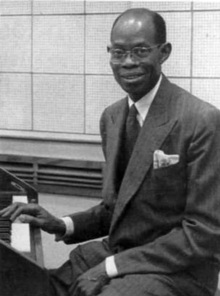Fela Sowande facts for kids
Quick facts for kids
Chief
Fela Sowande
|
|
|---|---|
 |
|
| Born | 29 May 1905 Abeokuta, Nigeria
|
| Died | 13 March 1987 (aged 81) Ravenna, Ohio, United States
|
| Nationality | Nigerian |
| Occupation | Musician and composer |
Chief Olufela Obafunmilayo "Fela" Sowande MBE (born May 29, 1905 – died March 13, 1987) was a famous Nigerian musician and composer.
Many people see Sowande as the father of modern Nigerian art music. He is probably the most well-known African composer who wrote music in the European "classical" style.
Contents
Early Life and Musical Beginnings
Fela Sowande was born in Abeokuta, a city near Lagos, Nigeria. His father, Emmanuel Sowande, was a priest and a pioneer in Nigerian church music.
As a child, Fela sang in the choir at the Cathedral Church of Christ. He went to the C.M.S. Grammar School and later to King's College, Lagos. His father and Dr. T. K. Ekundayo Phillips, who was a composer and organist, greatly influenced him.
Young Fela was a chorister and learned about new Yoruba songs that were being used in churches. He also studied the organ with Phillips. He learned about famous European classical composers like Bach. Fela earned a special diploma from the Royal College of Organists. At the same time, he was also a bandleader, playing jazz and popular highlife music. All these different styles helped shape his own music.
Life in London
In 1934, Sowande moved to London to study European classical and popular music. He quickly became very active in the music scene.
In 1936, he was a solo pianist in a performance of George Gershwin's famous piece, Rhapsody in Blue. He also played piano with the legendary musician Fats Waller. Sowande worked as a theatre organist for the BBC and was a choirmaster at Kingsway Hall. He also played piano in a big show called Blackbirds in 1936.
Later, in 1939, he played the organ on recordings for popular singers like Adelaide Hall and Vera Lynn. He continued his organ studies and became a Fellow of the Royal College of Organists in 1943. He won several awards for his skills.
Sowande also earned a Bachelor of Music degree from the University of London. He became a Fellow of Trinity College of Music. During the Second World War, he worked as a music advisor for the Colonial Film Unit. He created background music for educational films.
From 1945 to 1952, he was a well-known organist and choirmaster at the West London Methodist Mission. Many of his organ pieces come from this time. These pieces often used Nigerian melodies. This made his music special for the Black members of his church. He also became known for playing the Hammond organ and leading dance bands.
Sowande's Musical Style
Fela Sowande's music mixes Western and African ideas. His organ works include pieces like Yorùbá Lament, Obangiji, and Gloria. Most of these show a strong influence from Anglican Church music. They also combine this with Yoruba pentatonic melodies, which are traditional African scales.
His music for orchestras includes Six Sketches for Full Orchestra and African Suite. These pieces use African rhythms and harmonies. The last part of his African Suite became very popular in Canada. It was used as the theme song for a TV music show called Gilmour's Albums.
Sowande also wrote many songs for choirs, both religious and non-religious. Some of these were created when he worked for the BBC Africa Service. He later returned to Nigeria to work with the Nigerian Broadcasting Corporation and the University of Ibadan. In 1955, he received the MBE award for his work in Nigerian broadcasting. In 1968, he moved to the United States. He taught at Howard University and then at the University of Pittsburgh.
Later Life and Legacy
In his final years, Fela Sowande taught at Kent State University in Ohio. He lived in Ravenna, Ohio with his wife, Eleanor McKinney. He passed away in Ravenna and is buried in Randolph Township, Ohio.
Besides being a professor, Sowande also held the traditional Nigerian title of Bariyo of Lagos. People are now working to create a center to study and share his music. Many of his works are not yet published or are hard to find.
Selected Compositions
Fela Sowande wrote many different kinds of music. Here are some examples:
Organ Music
- Ka Mura (1945)
- Pastourelle (1952)
- Jesu Olugbala (1955)
- Yorùbá Lament (1955)
- Gloria (1958)
Choral Music
- "The Wedding Day" (1957)
- "Sometimes I Feel Like a Motherless Child" (1955)
- "My Way's Cloudy" (1955)
- "Nigerian National Anthem" (an arrangement, 1960)
Orchestral Music
- African Suite for string orchestra (1955)
- Folk Symphony for full orchestra (1960)
See also
 In Spanish: Fela Sowande para niños
In Spanish: Fela Sowande para niños
 | Aurelia Browder |
 | Nannie Helen Burroughs |
 | Michelle Alexander |

